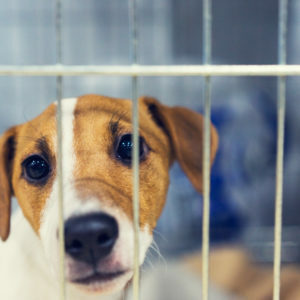If you’re thinking about adopting a rescue dog, good for you. But you should also do your homework.
The Centers for Disease Control and Prevention recently declared an extension of a suspension of dog imports from 110 countries. The move is designed to mitigate the risk of animal diseases accidentally spreading.
According to the Agriculture Department, 1 million dogs are imported every year and regulations are lax. That’s convenient if you take your pet dog on a trip. But the lack of regulations has also given rise to pet trafficking, often under the guise of “animal rescue,” and a serious risk of disease outbreak.
According to the CDC, “Many dogs are bred irresponsibly in large numbers in ‘puppy mills’ overseas, where the risk of congenital abnormalities and disease is high. Importers then fly them as cargo in large batches, claiming them as ‘rescue’ dogs, valued at $0 on their paperwork, and allowing the importers to evade entry and broker fees.”
In June 2020, a Ukrainian International Airlines plane arrived in Toronto, where Canadian authorities found 500 crated purebred puppies. Many were dehydrated and weak, and 38 were dead.
Ironically, pet trafficking is being driven by laws that try to improve animal welfare.
Over the last few years, some states — including California, Illinois and New York — have banned pet stores from selling dogs from breeders. Pet stores may only sell dogs that have been “rescued.”
Supposedly, these laws help combat puppy mills. They’ve done the opposite.
Pet traffickers breed high-demand puppies like French bulldogs in foreign puppy mills, then fool unsuspecting families by marketing them as “well-bred, American-born puppies” on social media. These puppies are sold for up to $5,000.
In other words, laws aimed at fighting American puppy mills have directly contributed to animals being imported from foreign puppy mills.
Pet imports have brought diseases to America, with deadly results, linked to both pet traffickers as well as legitimate rescues.
Disease experts believe animal rescuers introduced H3N2 Asian dog flu to America in 2015 while moving dogs from Asia to shelters here. The disease sickened more than 1,000 dogs in the Chicago area, killing several. The disease has continued to reappear. Los Angeles saw 1,300 cases of dog flu in the second half of 2021.
“It is likely that some or all of the introductions of H3N2 (canine influenza virus) into the United States occurred through the transfer of rescued dogs from Asia,” wrote a team of disease experts in the Journal of Virology.
Other diseases have been tied to animal rescue as well. According to the CDC, brucellosis and rabies are two of the most common zoonotic diseases that are found in illegal dog importations — and both can be passed on to humans. Cases of deadly brucellosis at Wisconsin animal shelters were linked to an import of rescue dogs. And a dog brought to Canada from South Korea by rescuers in 2018 also carried with it a new form of deadly canine distemper.
Animal rights activists, who oppose meat consumption, often use zoonotic diseases as justification to urge lawmakers to attack farmers. For example, the American Society for the Prevention of Cruelty to Animals calls farms “the perfect breeding ground for zoonotic diseases” on its website.
In truth, farms are not “breeding grounds” for zoonotic diseases in America, where there are strict biosecurity protocols. The black market for dog importation, however, is a serious threat to public health. And yet, those who attack farmers are turning a blind eye when it comes to these illegal importations.
Why? Because these groups may get hundreds of thousands in donations every time they do an international rescue.
Pet breeders who care about the animals are going out of business due to bans on pet stores selling pets. Meanwhile, pet traffickers are thriving at the expense of animals, as well as families that may have to pay thousands of dollars in unexpected medical bills for their new “rescue.”
If lawmakers want to crack down on puppy mills, prevent diseases and improve animal welfare, they would be wise to rethink their strategy. Instead of banning the sale of pets, which just creates a black market, they should focus on making sure all pets sold — or adopted from a rescue — are treated humanely. And they should pass the Healthy Dog Importation Act, a federal bill endorsed by veterinarians that would increase regulations to mitigate the risk of disease.
In the meantime, if you are looking to get a puppy, do your due diligence.





